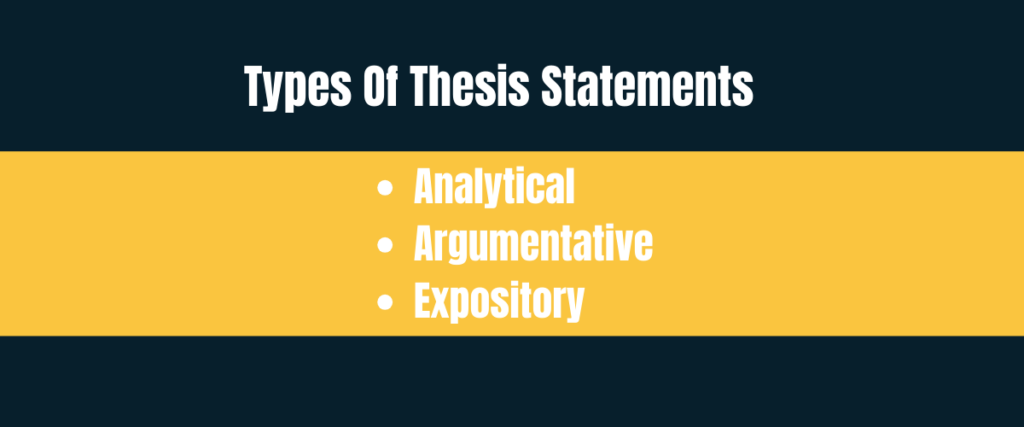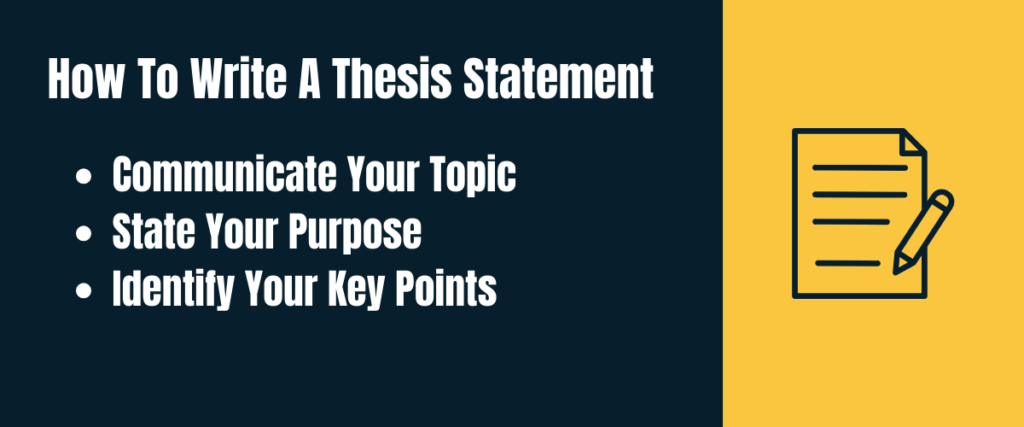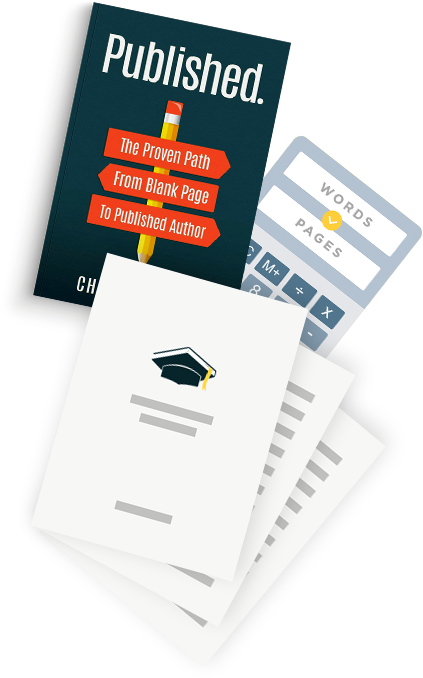If you’ve ever chatted with someone in university, or perhaps are currently enrolled in one, you’ve likely heard an overwhelmed student say, “I’m struggling with how to write a thesis.”
Writing your thesis is a crucial component of a liberal arts degree. Colleges and universities often require students in their senior year to develop both a thesis statement and then expand on it in a final thesis paper.
Whether you are a student at a university, considering enrolling, or curious about how to write a thesis, this post is designed for you.
No matter where you are with your thesis, this guide can help you develop a thesis that will leave your professors pleased and inspired. So, how to write a thesis, and how do you overcome the roadblocks to writing one?
How To Write A Thesis: What’s Covered
- What Is An Example Of A Thesis?
- Types Of Thesis Statements
- How Do I Write A Thesis Statement?
- How To Write A Thesis: Start Today
What Is An Example Of A Thesis?
A simple example of a thesis statement is, “Aspiring thought-leaders should publish a book because books add credibility to their authors.” The thesis paper would then extrapolate on this statement.
If you are writing a book for the first time, you know the importance of developing your elevator pitch. A thesis statement is similar: it is the key component your thesis paper is built around.
Please note: A thesis paper, often called your final thesis, is a well-researched, lengthy paper you must write to graduate from your specific program. However, in this post, I focus strictly on how to write a thesis statement.
Types Of Thesis Statements
A major factor of writing your thesis happens before you ever sit down to write. Before actually writing your thesis, it’s vital to identify what type of thesis statement you want to write. Just as there are types of motivational books, there are various types of thesis statements.
There are three core angles you can take when learning how to write a thesis:
- Analytical
- Argumentative
- Expository
An explanation on each…

1. Analytical
When you choose to write an analytical thesis statement, your focus centers on a particular idea, belief, problem, etc.
Writing your thesis statement in this manner sets you up to discuss the varying aspects of your particular topic in your paper. You can think of an analytical thesis statement as a review of the idea, belief, or problem you choose to discuss.
Imagine you’re in your final year at your university and majoring in literature. Your homework is to write a thesis statement that encapsulates what will become your final thesis paper. Perhaps you want to analyze the characters in Jane Austen’s novel, Emma.
An analytical thesis statement may take the following form: Jane Austen’s, Emma, reveals two types of characters: one with unbounded pride that gets her into trouble, and one with an honesty reigned in by tact.
2. Argumentative
Writing from an argumentative viewpoint will also require you to both find and present evidence to support your argument.
Usually, students write argumentative thesis statements to inspire their audience to make some type of change.
You could argue the importance of no caffeine after 10 a.m., or how caffeine aids study habits. These opposing arguments each demand credible evidence, which you would present in your thesis paper.
For example: While some writers are more talented than others, all writers should take classes in self-editing to ensure their readers receive the best stories possible.
3. Expository
Learning how to write an expository thesis is less like writing a review (analytical) and more like writing a guide. An expository thesis statement does not seek to analyze a topic or sway an audience to make a particular change.
Instead, learning how to write a thesis that is expository heavily relies on empathy, or getting into the heads of your audience members. How can you best explain a topic or idea to them?
An example of an expository thesis is: During book launch time, a typical author’s life encompasses doing interviews, speaking on podcasts, engaging with readers, all to promote their book.
A second example would be teaching your audience how to analyze a character rather than simply analyzing characters (analytical).
How To Identify Thesis Statements
Here are several examples to get you in the headspace on this topic:
- Expository: The life of a writer is spent researching, drafting, and editing their work.
- Argumentative: Writers should take a public speaking course before publishing their debut book.
- Another Argumentative: Learning to self-edit is crucial to your writing success.
- Analytical: Debut authors find it difficult to traditionally publish without a substantial platform.
Notice how the first thesis is more explanatory. It explains what a writer does. The second two are considered more argumentative. They express an opinion. The last will simply analyze a current publishing trend.
An analytical thesis paper dives into exposition explaining the thesis, while a paper on the second two would need to substantiate the claims.
The fourth would center less on providing evidence and more on sharing details surrounding the topic.
Now that you have an example of how to write a thesis statement that is analytical, argumentative, and expository, how do you actually write one?
How Do I Write A Thesis Statement?
Arguably, the best way to learn how to write a thesis that resonates with your audience is to spend quite a bit of time developing various iterations of your statement.
Going back to the example of an elevator pitch, writers are told to write the pitch before the book. For most writers, crafting a compelling pitch that hooks readers takes many tries. Oftentimes, pitches help writers ensure they don’t create flat character arcs and boring plots.
The same goes for your thesis statement. For instance, imagine you start with one of the examples used above: Writers should take a public speaking course before publishing their debut book.
Come up with five to ten variations of the example and think through each one. Which one best demonstrates your idea, ideally, in the fewest number of words?
“If you can’t explain it to a six year old, you don’t understand it yourself.”
Albert Einstein
If you can’t articulate your key statement clearly, your paper will lack focus.
To write a book, you must start writing, and to write a thesis, you must put pen to paper. Just as learning how to write a book starts with sitting down to a blank screen, learning how to write a thesis statement starts with a clean slate as well. So, what are the parts of a thesis statement?

Communicate Your Topic
Readers won’t gravitate to your thesis if they don’t understand what it’s about. Before deciding to communicate what type of thesis you will write, be sure to succinctly communicate your topic.
To continue with the above example of Emma, you do not have to choose if you will write an analytical, argumentative, or expository thesis before stating your topic. It can be helpful to do so, but no matter what, be clear about your subject matter.
“The characters in Jane Austen’s, Emma…”
That’s all you need. You’re not stating if you have an argument or not, just simply grounding your audience in the topic. Your audience now knows what you’re writing about.
State Your Purpose
Next, it’s time to state why you are writing your thesis to begin with. While many students learn how to write a thesis simply to earn their degree, chances are you’re actually interested in the topic at hand.
Ask yourself the following:
- Why did I choose this topic?
- What do I hope to communicate to my audience?
- What specific angle will I take in my paper?
Perhaps you want to encourage your audience to read Emma to learn valuable life lessons.
- “The characters in Jane Austen’s Emma teach two crucial life lessons readers of all ages can benefit from.” This is an expository statement.
- “Two characters in Jane Austen’s Emma embody key traits every writer should study in order to create well-rounded protagonists.” This is argumentative—you hope to convince writers to study Emma.
- “Two characters in Jane Austen’s Emma showcase narcissism and its antithesis, humility.” This is analytical—diving deeper into the character traits of Emma and Mr. Knightley.
Regardless of which type of thesis you choose to write, now your audience knows why you’re writing it: to explain, argue a point, or analyze.
Identify Your Key Points
Next up, prepare your audience by sharing the crucial points you focus on. If you choose to write a thesis that is argumentative, this is where you make your claim. A claim is your opinion or the stance you choose to take.
In the example above, the claim was that every writer should study Emma in order to create well-rounded protagonists.
But let’s say you just want to write an expository thesis. Maybe you will explain Emma’s character arc. Your points could be: her character on page one, what creates her character change, and how her character changes after the fact.
How To Write A Thesis: Start Today
Learning how to write a thesis is your first step forward. But rather than stop at learning how to write a thesis, now it’s time to actually write it!
To help give you the best chance possible at success, I include a free resource with over 300 strong verbs to choose from. As you craft your thesis statement, make sure to strong nouns and verbs, and always eliminate the weak verbs. Best wishes!



